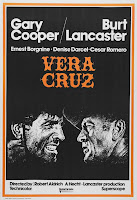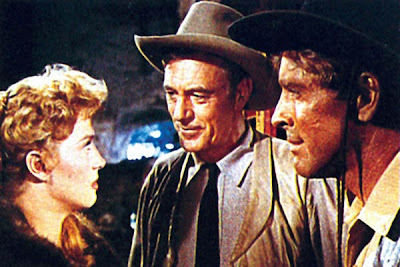Vera Cruz
In "Foreign Intervention and the American Western", DVD Savant argues that:
 It's generally acknowledged that Vera Cruz is a transitional Western: though it is apparently structured by the clear-cut "white hat / black hat" morality of its predecessors, with its hero Benjamin Trane (Gary Cooper) playing against anti-hero Joe Erin (Burt Lancaster), it consistently threatens to reveal a much more cynical world outlook.
It's generally acknowledged that Vera Cruz is a transitional Western: though it is apparently structured by the clear-cut "white hat / black hat" morality of its predecessors, with its hero Benjamin Trane (Gary Cooper) playing against anti-hero Joe Erin (Burt Lancaster), it consistently threatens to reveal a much more cynical world outlook.
Everyone here is double (or even triple) crossing everyone else. Violence is everywhere, and seldom if ever redeeming. And Trane only reluctantly, and not entirely convincingly, opts for principle over personal gain in the film's final frames. Indeed, in killing Erin in a climactic shoot-out, Trane remains within the logic of dog-eat-dog trust-nobody self-reliance that Erin himself had preached, even if he first gives Erin a fighting chance and then throws Erin's gun away as if in disgust of what he himself has been led to do.
Moreover Lancaster's utterly amoral Erin is easily the most attractive character among this den of brigands and traitors: his astonishing white-toothed grin is undeniably seductive, and demonstrates his personal joie de vivre in marked contrast with the weary mien of Cooper's Trane, a man marked by his participation on the losing side of the US civil war.
The other figures in a plot set during the Mexican rebellion against Emperor Maximilian include a French Marquis, his squeeze the unreliable Countess Duvarre, the peasant thief Nina, and rebel General Ramírez, among others. All have their eyes on $3,000,000 in gold coins that is hidden in the Countess's carriage. The subterfuge of hiding it there is perfectly transparent almost from the outset: Trane and Erin soon note that the lady's carriage is much heavier than the accompanying wagon laden with supplies. Moreover, the American mercenaries scarcely hide the fact that what they are after is money, and they'll fight for whomever offers them the fattest wage packet. There's not much ideology here, except for some vague appeals to the notion that the Mexican people might ultimately have the right to rebel against French oppression.

But the Mexican characters are never fleshed out, a fact that caused plenty of consternation in Mexico at the time, leading to harsh scrutiny of the subsequent production, likewise south of the border, of The Magnificent Seven. Ironically, however, it's Vera Cruz whose politics are more radical. The Magnificent Seven still holds out hope for liberal interventionism. Released the year of the United Fruit-instigated and CIA-sponsored coup in Guatemala, Vera Cruz argues that it's hard, cold cash that matters most when the USA embarks on military adventures abroad.
YouTube link: the film's opening titles.
The subgenre of Westerns about gun-toting Americans adventuring in Mexico can be seen as an ever-changing record of U.S. attitudes toward U.S. military intervention overseas, our real "foreign policy," as it were. Nothing defines Americans better than how they comport themselves when off U.S. soil.I agree, obviously enough, with the thrust of this comment. I'd only add that it's not just Westerns and not just movies set in Mexico that reveal something important about the United States. But perhaps it's true that Mexican-set Westerns show a particular concern with the morality (or otherwise) of violent intervention.
 It's generally acknowledged that Vera Cruz is a transitional Western: though it is apparently structured by the clear-cut "white hat / black hat" morality of its predecessors, with its hero Benjamin Trane (Gary Cooper) playing against anti-hero Joe Erin (Burt Lancaster), it consistently threatens to reveal a much more cynical world outlook.
It's generally acknowledged that Vera Cruz is a transitional Western: though it is apparently structured by the clear-cut "white hat / black hat" morality of its predecessors, with its hero Benjamin Trane (Gary Cooper) playing against anti-hero Joe Erin (Burt Lancaster), it consistently threatens to reveal a much more cynical world outlook. Everyone here is double (or even triple) crossing everyone else. Violence is everywhere, and seldom if ever redeeming. And Trane only reluctantly, and not entirely convincingly, opts for principle over personal gain in the film's final frames. Indeed, in killing Erin in a climactic shoot-out, Trane remains within the logic of dog-eat-dog trust-nobody self-reliance that Erin himself had preached, even if he first gives Erin a fighting chance and then throws Erin's gun away as if in disgust of what he himself has been led to do.
Moreover Lancaster's utterly amoral Erin is easily the most attractive character among this den of brigands and traitors: his astonishing white-toothed grin is undeniably seductive, and demonstrates his personal joie de vivre in marked contrast with the weary mien of Cooper's Trane, a man marked by his participation on the losing side of the US civil war.
The other figures in a plot set during the Mexican rebellion against Emperor Maximilian include a French Marquis, his squeeze the unreliable Countess Duvarre, the peasant thief Nina, and rebel General Ramírez, among others. All have their eyes on $3,000,000 in gold coins that is hidden in the Countess's carriage. The subterfuge of hiding it there is perfectly transparent almost from the outset: Trane and Erin soon note that the lady's carriage is much heavier than the accompanying wagon laden with supplies. Moreover, the American mercenaries scarcely hide the fact that what they are after is money, and they'll fight for whomever offers them the fattest wage packet. There's not much ideology here, except for some vague appeals to the notion that the Mexican people might ultimately have the right to rebel against French oppression.

But the Mexican characters are never fleshed out, a fact that caused plenty of consternation in Mexico at the time, leading to harsh scrutiny of the subsequent production, likewise south of the border, of The Magnificent Seven. Ironically, however, it's Vera Cruz whose politics are more radical. The Magnificent Seven still holds out hope for liberal interventionism. Released the year of the United Fruit-instigated and CIA-sponsored coup in Guatemala, Vera Cruz argues that it's hard, cold cash that matters most when the USA embarks on military adventures abroad.
YouTube link: the film's opening titles.
